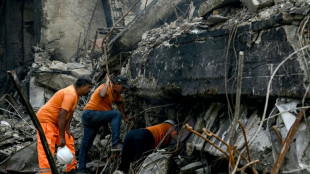
-
 Trump rules out force against Greenland but demands 'immediate' talks
Trump rules out force against Greenland but demands 'immediate' talks
-
Israeli strike kills three Gaza journalists including AFP freelancer

-
 US Congress targets Clintons in Epstein contempt fight
US Congress targets Clintons in Epstein contempt fight
-
Huge lines, laughs and gasps as Trump addresses Davos elites
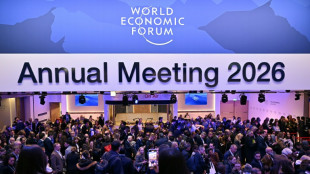
-
 Trump at Davos demands 'immediate' Greenland talks but rules out force
Trump at Davos demands 'immediate' Greenland talks but rules out force
-
Australia pauses for victims of Bondi Beach shooting

-
 Prince Harry says tabloid coverage felt like 'full blown stalking'
Prince Harry says tabloid coverage felt like 'full blown stalking'
-
Galthie drops experienced trio for France's Six Nations opener

-
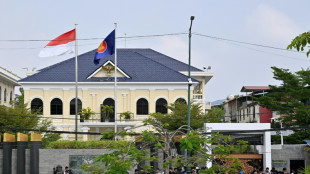 Over 1,400 Indonesians leave Cambodian scam groups in five days: embassy
Over 1,400 Indonesians leave Cambodian scam groups in five days: embassy
-
ICC rejects Bangladesh's plea to play T20 World Cup matches outside India

-
 Prince Harry says UK tabloid court battle in 'public's interest'
Prince Harry says UK tabloid court battle in 'public's interest'
-
Trump lands in Davos to push Greenland claims

-
 Balkan wild rivers in steady decline: study
Balkan wild rivers in steady decline: study
-
Injured Capuozzo misses out on Italy Six Nations squad

-
 Mourners pay last respects to Italian icon Valentino
Mourners pay last respects to Italian icon Valentino
-
EU parliament refers Mercosur trade deal to bloc's top court

-
 Odermatt seeks first Kitzbuehel victory with eye on Olympics
Odermatt seeks first Kitzbuehel victory with eye on Olympics
-
Italy's Brignone to be rested for Spindleruv Mlyn giant slalom

-
 Alcaraz spearheads big names into Australian Open third round
Alcaraz spearheads big names into Australian Open third round
-
European stocks dip ahead of Trump's Davos speech

-
 Trump flies into Davos maelstrom over Greenland
Trump flies into Davos maelstrom over Greenland
-
EU won't ask Big Tech to pay for telecoms overhaul

-
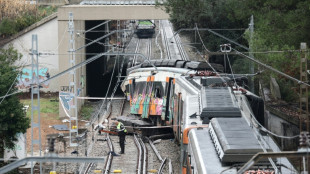 Railway safety questioned as Spain reels from twin train disasters
Railway safety questioned as Spain reels from twin train disasters
-
Marcell Jacobs back with coach who led him to Olympic gold

-
 Syria army enters Al-Hol camp holding relatives of jihadists: AFP
Syria army enters Al-Hol camp holding relatives of jihadists: AFP
-
Brook apologises, admits nightclub fracas 'not the right thing to do'

-
 NATO chief says 'thoughtful diplomacy' only way to deal with Greenland crisis
NATO chief says 'thoughtful diplomacy' only way to deal with Greenland crisis
-
Widow of Iran's last shah says 'no turning back' after protests

-
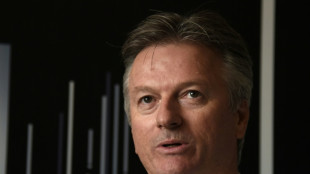 Waugh targets cricket's 'last great frontier' with European T20 venture
Waugh targets cricket's 'last great frontier' with European T20 venture
-
Burberry sales rise as China demand improves
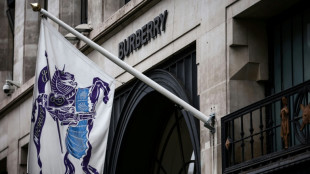
-
 Botswana warns diamond oversupply to hit growth
Botswana warns diamond oversupply to hit growth
-
Spaniard condemns 'ignorant drunks' after Melbourne confrontation

-
 Philippines to end short-lived ban on Musk's Grok chatbot
Philippines to end short-lived ban on Musk's Grok chatbot
-
Police smash European synthetic drug ring in 'largest-ever' op

-
 Japan to restart world's biggest nuclear plant Wednesday
Japan to restart world's biggest nuclear plant Wednesday
-
South Korean ex-PM Han gets 23 years jail for martial law role

-
 Alcaraz, Sabalenka, Gauff surge into Australian Open third round
Alcaraz, Sabalenka, Gauff surge into Australian Open third round
-
Over 1,400 Indonesians left Cambodian scam groups in five days: embassy
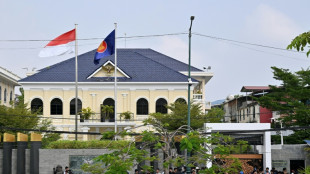
-
 Raducanu to 're-evaluate' after flat Australian Open exit
Raducanu to 're-evaluate' after flat Australian Open exit
-
Doncic triple-double leads Lakers comeback over Nuggets, Rockets down Spurs

-
 Bangladesh will not back down to 'coercion' in India T20 World Cup row
Bangladesh will not back down to 'coercion' in India T20 World Cup row
-
Alcaraz comes good after shaky start to make Australian Open third round

-
 Trump departs for Davos forum again after switching to new plane: AFP
Trump departs for Davos forum again after switching to new plane: AFP
-
Impressive Gauff storms into Australian Open third round

-
 Dazzling Chinese AI debuts mask growing pains
Dazzling Chinese AI debuts mask growing pains
-
Medvedev battles into Melbourne third round after early scare
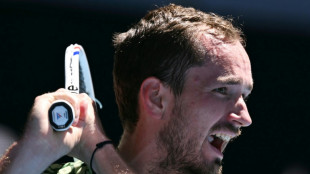
-
 Denmark's Andresen upstages sprint stars to take Tour Down Under opener
Denmark's Andresen upstages sprint stars to take Tour Down Under opener
-
Turkey's Sonmez soaks in acclaim on historic Melbourne run

-
 Sheppard leads Rockets to sink Spurs in Texas derby
Sheppard leads Rockets to sink Spurs in Texas derby
-
Sabalenka shuts down political talk after Ukrainian's ban call


'Witnesses to despair': Marseille sees poverty fuel cocaine problem
It's nine in the morning and Marseille city contractors armed with long tongs were picking up syringes amid the morning crowd, dropping them one by one into a yellow recipient fixed on a cart.
The scene, on the central Belsunce Square near the busy Old Port, plays out daily, an illustration of the second-biggest French city's massive drug problem.
On pavements, in doorways and in parking lots, more users than ever can be seen shooting up cocaine or smoking crack.
Many aimlessly wander the streets of the Mediterranean port city, which became notorious decades ago for its role as a heroin hub in the so-called "French connection" trade route, and today cannot get a grip on a thriving narcotics business.
At lunchtime, a man lay sprawled on the street outside the parking lot of a shopping centre, two needles sticking out of his right arm.
"You see more and more young people and women," said Youcef Mahi, a janitor.
"I'm not judging. We are witnesses to despair."
- Crack 'drives you crazy' -
The city's budget for cleaning up after the addicts has risen six-fold to reach 152,000 euros ($177,000) this year, outweighing public subsidies for NGOs dedicated to reducing risks for drug users.
But Antoine Henry, who runs the ASUD association to keep addicts safe, said more money should be funnelled into projects such as his.
By his estimates, "2,000 users live in the streets of central Marseille, most of them without a home or income, often carrying infections, with no access to benefits, and sometimes undocumented."
He said the sharp increase is partly due to overall rising poverty in what is already France's lowest-income large city, with the proliferation of downtown dealing spots over the past two years also to blame.
Such spots are outposts of the main dealing rings located in low-income housing estates, and closer to socially vulnerable consumers who buy their cocaine there, usually for 10 euros ($11.60) a pop.
On one Marseille street, a young lookout, called "chouf" (Arabic for 'look'), had taken up his post, only a few dozen metres from the main Canebiere thoroughfare and its municipal police headquarters.
One 36-year-old woman, who did not want to be identified, told AFP that she lives in the street, except when she is in prison.
She was seriously ill, shivering below her parka despite the hot July sun. She shoots cocaine, but does not smoke crack because, she said, "that drives you crazy".
She said she tries to stay clear of police and doctors, but also of dealers and their gangland fights and shootouts.
Marseille and its surrounding region are plagued by a turf war over lucrative drug points. In 2023, 49 deaths linked to drug trafficking were recorded in Marseille in connection with gang warfare, and 24 in 2024.
- Clean syringes, rapid tests -
Joachim Levy regularly seeks out the woman when he and his colleagues from the Nouvelle Aube (New Dawn) association roam the streets in search of people in need of help.
He has constantly urged her to accept treatment.
"Otherwise you're going to die here," he said.
At the foot of a building, a small group, like dozens of others in the neighbourhood, was cooking crack and crushing pills.
In contrast to Paris, crack is rarely sold ready to consume here.
Instead, users concoct it themselves by heating cocaine with ammonia.
From his backpack, Levy handed out sealed syringes, pipes, disinfectant wipes and bicarbonate, which he said is "less harmful" than ammonia.
A few streets away, a team from Nouvelle Aube were talking with men sheltering under the A7 highway.
"We offer rapid testing for HIV and hepatitis -- and direct them to the hospital if needed. They no longer have their own survival strategies," said Marie-Lou, a member of the association who did not give her surname.
- 'Poverty, isolation' -
A young woman, wearing glittery sneakers, a tight skirt and a handbag, turned a staircase corner.
She told Levy about her mounting debt and her temporary accommodation with her child "at an ex's place".
She used to smoke, and "snort a little", but then she turned to crack and soon realised she "was hooked".
Levy told the woman "to call anytime".
The biggest problem for people in her situation, he said, is not the actual drug use.
"It's the poverty, the isolation, the street violence, the mental health issues -- this is where we need to start," he said.
Levy believes supervised consumption facilities -- spaces where users can take their drugs safely -- could be "an excellent solution" to some of these issues.
Such "shoot-up rooms", as critics often call them, operate in several countries, including Germany, Norway, the Netherlands and Australia.
- No 'shoot-up room' -
Perrine Roux is research director at the INSERM health and medical research body, which has published an evaluation of France's only two experimental facilities in Paris and Strasbourg.
"All scientific studies, in France and abroad, have shown the usefulness of such facilities," she said.
"But nobody pays much attention to science, and that's very concerning."
The interior ministry shut down a plan to open such a facility in Marseille after complaints from some residents and local politicians.
On Thursday, the regional prefect announced an action plan against drug trafficking and related crimes, involving the deployment of additional police and anti-riot units "to give the dealing points a pounding", and of 310 extra security cameras.
Meanwhile in Belsunce Square, the water fountain has stopped working, a fact welcomed by one resident.
"Now that there's no water for them anymore, we may see less of the druggies," she said.
T.Germann--VB

